Dimitra Clubs in Malawi show promising results of a gender transformative approach
23 MARCH 2023
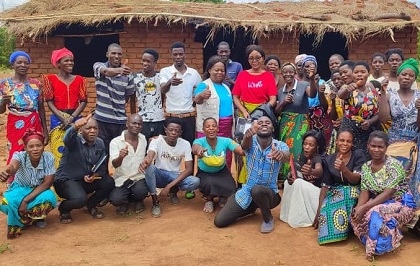
A community-led initiative to foster children's education enrolls 32 children in newly built nursery, with support from FAO through the Joint Programme on Gender Transformative Approaches for Food Security and Nutrition (JP GTA).
“As a parent myself, I know the best gift we can bequeath to the children is an education, or as is the case here, a good preparation for their education journey,” says Gertrude Soko, a volunteer teacher at the nursery school recently set up by the Dimitra Club in the village of Kapala in the district of Kasungu, Malawi.
The education sector in Malawi is divided into a formal and a non-formal component, with the latter comprising early childhood development (ECD), out of school youth education, and adult literacy. ECD is mostly offered through nursery schools. Because ECD is generally unstructured within the national provision of education, many children do not have access and therefore miss out on the cognitive and physical foundations needed for higher levels of education and lifelong development. Nursery schools in Malawi are often combined with feeding programmes, and children who do not attend these institutions can miss out on better nutrition.
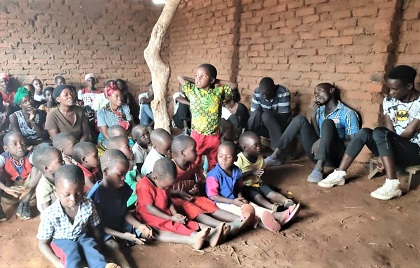
Kasungu district in central Malawi is one of the areas which has a dire need for ECD. It is the second largest district in Malawi with a population of almost 900 000, with only 182 community-based childcare centres catering to around 36 000 children.
In June 2022, acknowledging the urgent unmet need for ECD in their area, members of the Kapala Dimitra Club in the area of Traditional Authority Chizuma mobilized resources and built a shelter to house a nursery school for the children of Kapala, M’benthu and Bini villages.
Dimitra Clubs are self-run, informal groups of women, men and youth who meet to discuss common challenges and work together to find solutions using local resources. They promote social mobilization and participation of rural people in their community’s economic, political and social life. Agriculture is a frequent but not the only topic of discussion, as the Clubs also cover subjects such as climate change, education, health, infrastructure, nutrition, peace and women’s rights.
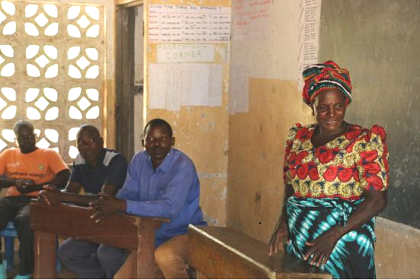
The Dimitra Clubs constitute FAO’s flagship gender transformative approach, contributing to the realization of Sustainable Development Goals 1 (reduce poverty), 2 (end hunger) and 3 (promote gender equality). While FAO assists in establishing the Clubs and offers training and support, the Clubs operate autonomously.
In Malawi, FAO is piloting the Dimitra Club approach in ten villages in the districts of Mangochi and Kasungu. The pilot is being conducted in the framework of the Joint Programme on Gender Transformative Approaches for Food Security and Nutrition (JP GTA), which FAO, IFAD and WFP are implementing in collaboration with and through financial support from the European Union. For the Dimitra Clubs component, FAO has partnered with two NGOs, the Rights Advice Centres in Mangochi and the Good Health Organization in Kasungu.
The Dimitra Club of the village of Kapala comprises 24 women and 14 men, with 22 members under the age of 35 categorized as youth. Rute Phiri, the secretary of Kapala Dimitra Club explains that the motivation to open the nursery school stemmed “from observing that results from our children in primary school had long been poor. On probing, we discovered that lack of early preparation was to blame… and to address that challenge, we decided to open the nursery school”.
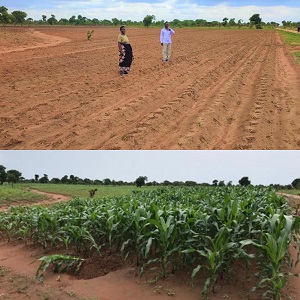 Currently, the school has 32 children enrolled. Parents are meant to contribute MK 500 (about $0.5) per child towards Gertrude Soko’s monthly salary and porridge for the children. However, the economic downturn following the COVID-19 pandemic has rendered many parents unable to pay even this modest fee. As a result, the Kapala Dimitra Club has stepped in, collecting monthly contributions from its affiliated Village Savings and Loan Association to cover the teacher’s honorarium. The amount is nowhere near what she would require, but in the true spirit of altruism embodied in the Club, Soko says: “This, I do as a passion and not as a job per se. The commitment of the Club here is encouraging.”
Currently, the school has 32 children enrolled. Parents are meant to contribute MK 500 (about $0.5) per child towards Gertrude Soko’s monthly salary and porridge for the children. However, the economic downturn following the COVID-19 pandemic has rendered many parents unable to pay even this modest fee. As a result, the Kapala Dimitra Club has stepped in, collecting monthly contributions from its affiliated Village Savings and Loan Association to cover the teacher’s honorarium. The amount is nowhere near what she would require, but in the true spirit of altruism embodied in the Club, Soko says: “This, I do as a passion and not as a job per se. The commitment of the Club here is encouraging.”
In addition to mobilizing resources and building a shelter to house the nursery school, the Kapala Dimitra Club has this year leased two acres of land where members have planted soybean. Some of the seeds will be milled into flour to ensure that the children have a porridge breakfast at school. The rest will be sold, and the proceeds used to pay the teacher, buy iron sheets to replace the grass thatch on the shelter and cover the mud floor with cement.
Hunger and low access to potable water are two of the three key challenges the Club identified to be addressed, the other being illiteracy. Adult literacy schools are being mooted to commence very soon at Kapala, with the support of the Dimitra Club.
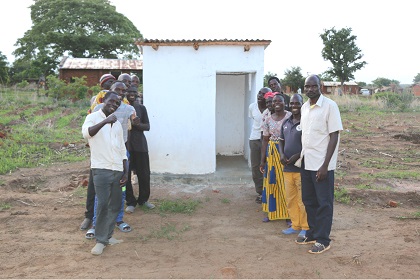
Since June 2022, when the first of the 20 Dimitra Clubs were formed in Kasungu and Mangochi districts, the communities have steadily been transforming themselves. In addition to the nursery school, office blocks and toilet units in schools have been constructed and earth roads repaired. Village Savings and Loan Associations are also thriving as vehicles for mobilizing resources.
Significantly, discriminatory social norms and mindsets that undermine development are steadily shifting thanks to the JP GTA’s interventions. Patriarchy is questioned, and women and men participate equally in all interfaces and projects of the Clubs. Women's leadership is no longer an anomaly nor an exception. Communities are now able to identify, prioritize and resolve challenges on their own as well as in collaborative initiatives with the government and different organizations.
Social cohesion is growing, demonstrated through the intentional collaboration of the people to build and maintain social facilities in their villages without external incentives. The growing influence of Club members on the rest of their communities, encouraging them to participate in projects addressing shared challenges, will only accelerate the rate at which Malawi progresses towards achieving its development goals.
Image captions:
- Members of Kapala Dimitra Club in front of the nursery school shelter they have constructed. Grace Soko is sitting at the far right. Next to her is Rute Phiri.
- Some of the pupils at Kapala Nursery School meet with members of the Dimitra Club.
- Group Village Headwoman Mzunda (Joyce Phiri) articulates the development projects that the Dimitra Club has implemented in the area.
- Members of Chamkoma Dimitra Club stand in the leased soya and maize plot of land in December 2022 (top) and January 2023 (bottom).
- Men and women of Chitsulo Dimitra Club stand in front of a toilet they recently constructed at a local school.
Image credits: ©FAO/Chisomo Mdalla
Contact:
- JP GTA: [email protected]




